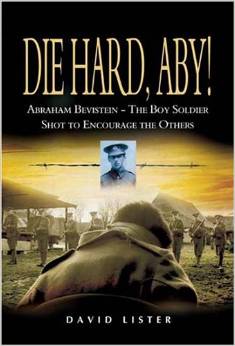Additions will be checked before being published on the website and where possible will be forwarded to the person who submitted the original entries. Your contact details will not be forwarded, but they can send a reply via this messaging system.
please scroll down to send a message
Pte. Abraham Beverstein
British Army 11th Btn. Middlesex Regiment
from:Whitechapel, London
(d.20th March 1916)
Abraham was executed for desertion 20/03/1916 and buried in Labourse Military Cemetery, Pas-de-Calais, France.
In September 1914 Abraham Beverstein, of Whitechapel in the east of London, joined the army under the name Abraham Harris. He did not tell his parents he had enlisted until afterwards: he was afraid they would have stopped him. He was 18 years old, and their only son. From the training camp at Aldershot, the boy wrote home: ‘I was very sorry to leave you, and very sorry to see you cry, but never mind, I will come back one day, so be happy at home. From your loving son Aby.’
In the spring of 1915 his battalion went to fight in France. (‘Dear mother, I do not like the trenches...’) At the end of the year Abraham was in the army hospital; an official telegram to his parents reported that he was ‘suffering from wounds and shock (mine explosion)’. In January 1916, however, he was able to write reassuringly, ‘I am feeling a little better, so don’t get upset’. Three weeks later he was sent back to his unit.
But soon afterwards another letter reached Whitechapel: ‘Dear mother, we were in the trenches and I was ill, so I went out and they took me to the prison, and I am in a bit of trouble now....I will have to go in front of a Court.’ This was the last his parents heard from Abraham.
In April they received the following letter, in every way insensitively expressed. It came from the senior officer in charge of Infantry records. ‘Sir, I am directed to inform you that a report has been received from the War Office to the effect that [Abraham’s army number and regiment – not his name] was sentenced after trial by court martial to suffer death by being shot for desertion, and the sentence was duly executed on 20th March 1916. I am, Sir, your obedient servant....’
In his statement to the court martial (he had no legal representation) Abraham explained, ‘I left the trenches because three rifle grenades exploded near me. I was deafened and my nerves had gone a bit.’ He saw a medical officer, who told the court he had ‘found him suffering from no appreciable disease... I told him he was fit for duty.’ Another soldier had come across Abraham by chance at the farm where the boy was billeted – the nearest thing to home. ‘Harris told me he had just come out of hospital,’ the soldier said. ‘He had no greatcoat or hat and was covered in mud. He stayed in the farm all afternoon sitting by the fire warming himself.’ In the evening Abraham was arrested.
His landlady at the farm told the court, ’He said the trenches were being bombed and he had left them and was going to England.’ Abraham himself said, ‘I felt nervous and lost my head. I thought I’d stay at the farm for a few days and go back to the company when they came out of the trenches.’ Those were the words that condemned him: the court was convinced that he had intended to desert.
Sylvia Pankhurst, a tireless campaigner for human rights and social reform, knew Mr and Mrs Beverstein and took up their son’s case. She published his letters in her magazine ‘Dreadnought’ and protested vehemently against the injustice of executing a 19-year-old volunteer who had endured 8 months in the trenches and had only just come out of hospital with injuries and shell-shock. As a result there was a question about Abraham in the House of Commons, but the only real outcome was that hence forward executed soldiers were simply said to have ‘died of wounds’.

